Picture a world where our devices operate more intelligently, not more strenuously. Welcome to the realm of efficient appliances. These cutting-edge gadgets are engineered to conserve energy, water, and fuel, all the while lessening our ecological footprint.
In this article, we will explore the different types of efficient appliances, provide tips for maximizing their efficiency, and discuss future trends in this ever-evolving field.
Join us as we uncover the secrets to creating a more sustainable and efficient home.
Key Takeaways
- Efficient appliances use less energy and resources to perform their intended functions.
- They save money on energy bills and contribute to a sustainable future.
- Efficient appliances reduce greenhouse gas emissions, air pollution, and reliance on fossil fuels.
- They improve indoor air quality and increase home comfort.
Definition of Efficient Appliances
Efficient appliances are those that use less energy and resources to perform their intended functions. Energy efficient refrigerators are designed to consume less electricity while still maintaining optimal cooling performance. These refrigerators are equipped with advanced insulation, efficient compressors, and temperature control features to minimize energy usage. By using less energy, they not only help reduce electricity bills but also contribute to a greener environment by reducing greenhouse gas emissions.

Similarly, water efficient washing machines are designed to use less water without compromising on cleaning efficiency. These machines incorporate features like load sensors, adjustable water levels, and efficient rinsing cycles to optimize water usage. By using less water, they not only help conserve a valuable resource but also reduce energy consumption required to heat the water.
Types of Efficient Appliances
Now let’s take a look at the different types of efficient appliances.
Energy-saving appliances offer a variety of benefits, such as reduced energy consumption and lower utility bills.
Additionally, there are several popular brands that are known for their efficient appliances, providing consumers with reliable and environmentally friendly options.

Energy-Saving Appliance Benefits
We can reap numerous benefits from using energy-saving appliances.
Energy-saving appliances are designed with specific features that help reduce energy consumption and lower utility bills. These appliances are built to be more efficient, using less energy while still delivering the same level of performance as their non-efficient counterparts.
By using energy-saving appliances, we can save money on our electricity bills and reduce our carbon footprint.
Moreover, energy-efficient home improvements can also contribute to a more sustainable lifestyle. These improvements can include installing solar panels, improving insulation, and using smart home technology to optimize energy usage.

Popular Efficient Appliance Brands
After researching and comparing various brands, we’ve found several popular appliance brands that are known for their efficiency. These brands have incorporated energy-saving appliance features into their products, helping consumers reduce their energy consumption and save on utility bills.
One popular brand is Samsung, which offers a wide range of energy-efficient appliances such as refrigerators, washing machines, and dishwashers. Their appliances are designed with innovative technologies that optimize energy usage without compromising performance.
Another well-known brand is LG, known for its energy-saving refrigerators, air conditioners, and televisions. LG appliances are equipped with features like inverter technology and smart sensors to minimize energy waste and provide optimal performance.
Whirlpool is also a top choice for energy-efficient appliances. They offer a variety of energy-saving options in their washers, dryers, and dishwashers, such as adaptive wash technology and sensor drying.
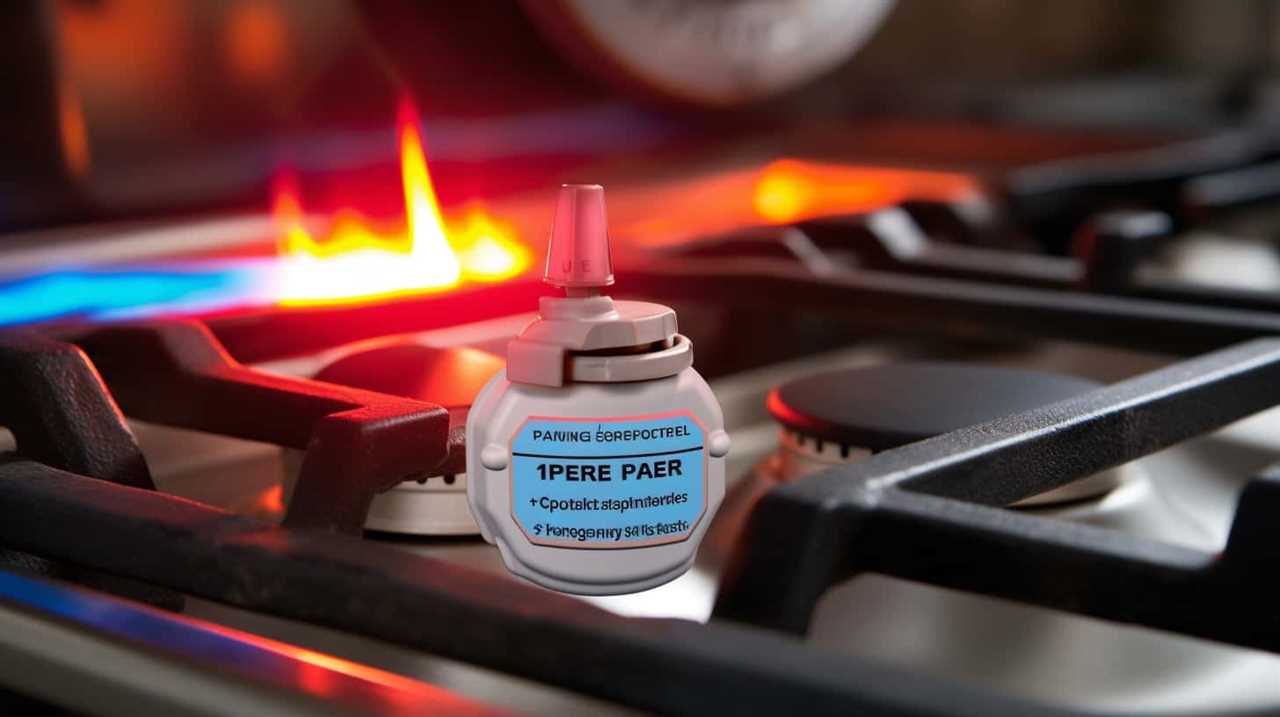
Energy-Efficient Appliances
When it comes to saving energy and reducing utility bills, one of the most effective ways is by using energy-efficient appliances. These appliances are designed to consume less energy while still providing the same level of performance. Energy-efficient lighting, such as LED bulbs, can significantly reduce electricity usage compared to traditional incandescent bulbs. Similarly, energy-efficient heating systems use advanced technologies to maximize heat output while minimizing energy consumption. To illustrate the benefits of energy-efficient appliances, consider the following table:
| Appliance | Energy Consumption (Watts) | Annual Energy Savings |
|---|---|---|
| Incandescent Bulb | 60 | – |
| LED Bulb | 10 | 438 kWh |
| Traditional Heater | 1500 | – |
| Energy-Efficient Heater | 1000 | 365 kWh |
Water-Efficient Appliances
When it comes to conserving water, using water-efficient appliances is key. These appliances not only help us reduce our water consumption but also offer a range of benefits such as lower water bills and reduced strain on water resources.
There are various types of water-efficient appliances available in the market, including low-flow toilets, water-saving dishwashers, and efficient washing machines.
Benefits of Conserving Water
We can reap numerous benefits by conserving water through the use of water-efficient appliances. Water conservation techniques and the importance of water conservation can’t be overstated.
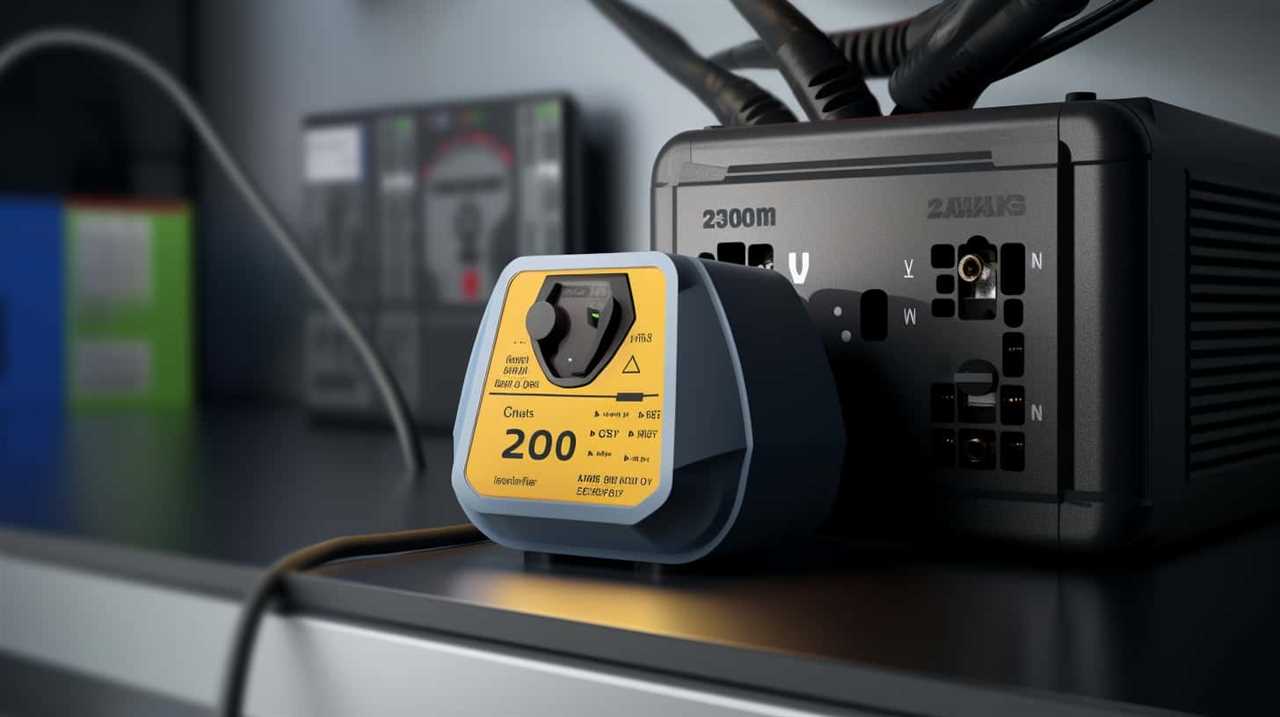
Here are four key benefits of using water-efficient appliances:
- Reduced water consumption: Water-efficient appliances use less water compared to traditional ones, helping to conserve this precious resource.
- Lower utility bills: By using less water, you can save money on your monthly water bills.
- Environmental preservation: Conserving water helps in protecting aquatic ecosystems and maintaining a sustainable environment.
- Energy savings: Water-efficient appliances often require less energy to operate, leading to reduced energy consumption and lower energy bills.
By understanding the benefits of conserving water, we can make informed choices when selecting and using water-efficient appliances.
Now, let’s explore the different types of water-efficient appliances available in the market.
Types of Water-Efficient Appliances
Now let’s explore the different types of water-efficient appliances available in the market.

Water-efficient showerheads are designed to reduce water consumption by limiting the flow rate while still providing a satisfying shower experience. These showerheads often use innovative technology, such as aerating or laminar flow, to mix air with water and create a steady stream. This allows for a refreshing shower while conserving water.
Energy-efficient washing machines are another type of water-efficient appliance. These machines use advanced technology, such as sensors and improved water circulation systems, to optimize water usage. They also have various settings and programs that allow users to adjust the water level based on the load size, further reducing water wastage.
Investing in water-efficient showerheads and energy-efficient washing machines not only helps conserve water but also saves energy and reduces utility bills.
Fuel-Efficient Appliances
To achieve fuel efficiency, we can rely on appliances that operate on renewable energy sources or utilize advanced technologies. By using these appliances, we can reduce our reliance on fossil fuels and decrease carbon emissions, contributing to a cleaner and more sustainable environment.

Here are four ways in which fuel-efficient appliances can make a difference:
- Renewable energy sources: Appliances that run on renewable energy, such as solar or wind power, eliminate the need for fossil fuels altogether, making them highly fuel-efficient and environmentally friendly.
- Energy-efficient technologies: Advanced technologies like energy-efficient motors, improved insulation, and smart sensors allow appliances to operate more efficiently, reducing the amount of fuel needed for their operation.
- Hybrid appliances: Hybrid appliances combine different energy sources, such as using electricity and gas, to optimize fuel consumption and minimize carbon emissions.
- Efficient combustion: Appliances that utilize efficient combustion processes, such as catalytic converters or high-efficiency burners, can maximize fuel utilization and minimize waste.
By incorporating these technologies, fuel-efficient appliances play a crucial role in reducing carbon emissions and conserving energy resources.
Now, let’s delve into how these efficient appliances work.
How Efficient Appliances Work
When it comes to understanding how efficient appliances work, it’s important to consider the energy-saving technology used in these devices.

By utilizing advanced features such as improved insulation, smart sensors, and variable-speed compressors, efficient appliances are able to optimize energy consumption and reduce waste.
This technology not only benefits the environment by reducing greenhouse gas emissions, but also offers financial savings to consumers through lower utility bills.
Energy-Saving Technology Explained
Exploring the inner workings of efficient appliances, we delve into the technology behind energy-saving features. Energy-saving technology is crucial for creating an energy-efficient home. Here’s how it works:
- Smart Sensors: Efficient appliances are equipped with sensors that detect and respond to changes in the environment. These sensors help adjust settings and optimize energy usage based on factors like temperature, humidity, and occupancy.
- Energy Management Systems: These systems enable appliances to communicate with each other and with the homeowner. They allow for better coordination and control of energy consumption, ensuring that appliances operate at their most efficient levels.
- Improved Insulation: Energy-saving appliances are designed with better insulation to reduce heat loss or gain. This helps maintain a stable temperature inside the appliance, minimizing the need for excessive energy consumption.
- Energy Recovery Systems: Some efficient appliances feature energy recovery systems that capture and reuse waste energy. This technology allows appliances to recycle heat or other forms of energy that would otherwise be lost.
Benefits of Efficient Appliances
Now let’s delve into the benefits of efficient appliances and see how they work to save energy and promote a more sustainable lifestyle.
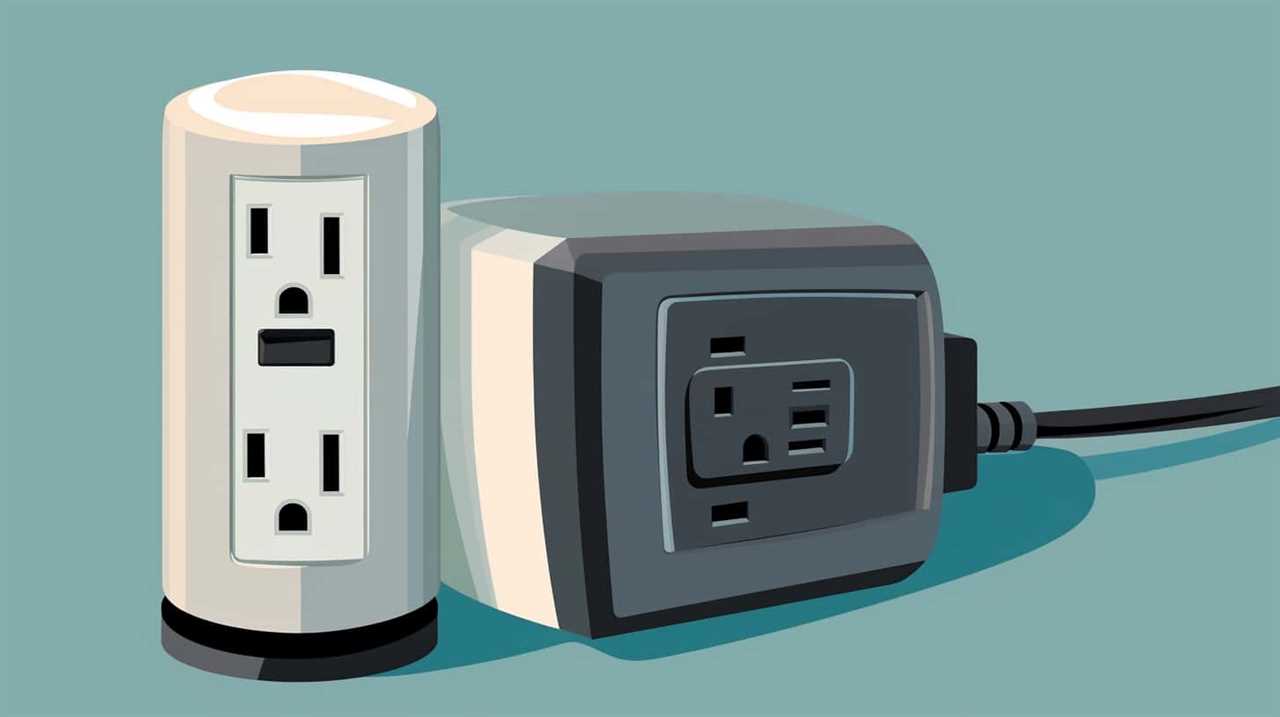
Energy efficient appliances offer numerous advantages, particularly for energy efficient homes and reducing carbon footprint. These appliances are designed with advanced technology that minimizes energy consumption while maximizing performance. By using less energy, they help homeowners save on their utility bills and contribute to a greener environment.
Efficient appliances achieve this by incorporating features such as improved insulation, better temperature control, and reduced standby power. Additionally, they often come with energy-saving modes and sensors that optimize energy usage based on specific needs.
Choosing efficient appliances not only benefits individuals, but it also plays a crucial role in creating a more sustainable future for our planet.
With this understanding, let’s now explore the factors to consider when choosing efficient appliances.

Factors to Consider When Choosing Efficient Appliances
One important factor to consider when choosing efficient appliances is their energy consumption. By selecting appliances with energy-saving technology, you can significantly reduce your energy usage and save on utility bills.
Here are four key factors to consider when choosing efficient appliances:
- Energy Efficiency Ratings: Look for appliances with high energy efficiency ratings such as Energy Star certification. These ratings indicate that the appliance meets strict energy-saving standards.
- Size and Capacity: Choose appliances that are appropriately sized for your needs. Oversized appliances can waste energy, while undersized ones may not be able to meet your requirements efficiently.
- Advanced Features: Consider appliances with advanced features like programmable settings, sensors, and timers. These features can optimize energy usage and reduce wastage.
- Maintenance and Lifespan: Research the maintenance requirements and expected lifespan of the appliances. Appliances that require frequent repairs or replacements can end up being less efficient in the long run.
Benefits of Using Efficient Appliances
Using efficient appliances has numerous benefits for both the environment and our wallets. Energy efficient home designs and smart home technology are two key factors that contribute to these benefits. By incorporating energy efficient home designs, such as proper insulation and efficient heating and cooling systems, we can significantly reduce our energy consumption. Smart home technology, on the other hand, allows us to control and monitor our appliances remotely, ensuring that they are only in use when needed.
To illustrate the benefits of using efficient appliances, consider the following table:
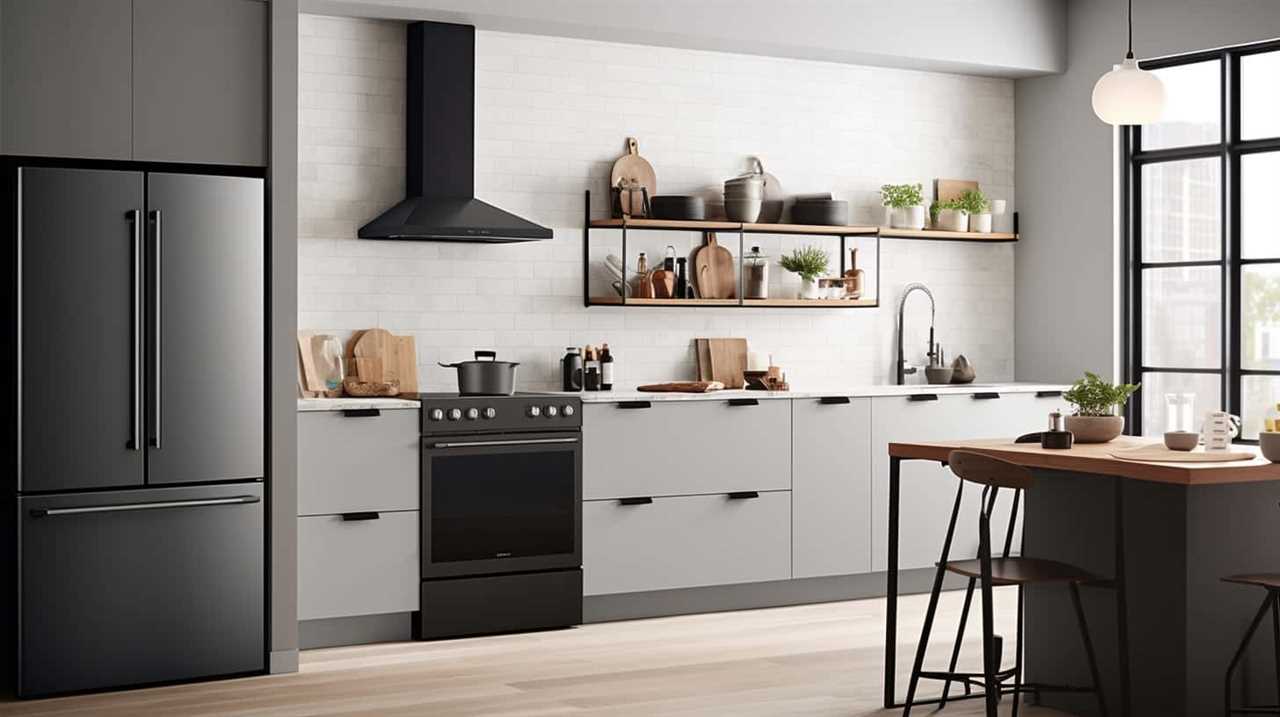
| Benefits of Using Efficient Appliances |
|---|
| Lower energy bills |
| Reduced carbon footprint |
| Longer lifespan of appliances |
| Increased comfort and convenience |
Cost Savings With Efficient Appliances
To achieve cost savings with efficient appliances, we can take advantage of their energy-saving features. Here are four ways in which these appliances can help us achieve cost effectiveness and long term savings:
- Reduced energy consumption: Efficient appliances use less energy to perform the same tasks, resulting in lower electricity bills.
- Water conservation: Some efficient appliances, such as dishwashers and washing machines, use less water per cycle, leading to reduced water bills.
- Extended lifespan: Efficient appliances are often built with higher quality materials and advanced technology, increasing their durability and lifespan. This means less frequent replacements and long-term savings.
- Government incentives: Many governments offer financial incentives, such as tax credits or rebates, for purchasing and using efficient appliances, further enhancing cost savings.
Environmental Impact of Efficient Appliances
Efficient appliances have a significant positive impact on the environment. By consuming less energy and water, they reduce greenhouse gas emissions and conserve natural resources. Additionally, efficient appliances comply with environmental regulations, ensuring that they are manufactured and operated in an environmentally responsible manner.
Consumer behavior also plays a crucial role in minimizing the environmental impact of appliances. When consumers choose energy-efficient models, they contribute to reducing overall energy demand and supporting the development of more sustainable technologies. By making informed choices and considering the environmental performance of appliances, consumers can actively contribute to a greener future.
To highlight the benefits of efficient appliances, consider the table below:

| Benefit | Description | Emotional Impact |
|---|---|---|
| Energy savings | Reduces carbon footprint | Environmentally conscious |
| Water conservation | Preserves freshwater resources | Responsible stewardship |
| Reduced pollution | Decreases air and water pollution | Healthier living conditions |
Efficient appliances not only provide economic benefits but also contribute to a cleaner and more sustainable environment. By adopting energy-efficient models and making conscious choices, consumers can help protect our planet for future generations.
Incorporating Efficient Appliances in Your Home
We can easily incorporate efficient appliances into our homes to save energy and reduce our environmental impact. Here are four steps to help you incorporate efficient appliances in your home:
- Assess your current appliances: Take inventory of your current appliances and identify which ones are energy-efficient and which ones are not. Replace the inefficient ones with energy-efficient models.
- Look for Energy Star labels: When shopping for new appliances, look for the Energy Star label. This label ensures that the appliance meets strict energy efficiency guidelines set by the Environmental Protection Agency.
- Opt for energy-saving features: Choose appliances with energy-saving features such as programmable thermostats, timers, and power-saving modes. These features can help reduce energy consumption.
- Proper maintenance: Regularly clean and maintain your appliances to ensure they’re operating at maximum efficiency. This includes cleaning filters, checking seals, and scheduling professional maintenance when needed.
Tips for Maximizing Efficiency With Appliances
By implementing simple practices, we can maximize the efficiency of our appliances in order to save energy and reduce our environmental impact. Here are some tips for saving energy and reducing utility bills.
- First, always choose energy-efficient appliances with high Energy Star ratings. These appliances are designed to consume less energy without sacrificing performance.
- Additionally, make sure to properly maintain your appliances by cleaning filters, coils, and vents regularly. This will improve their efficiency and extend their lifespan.
- Another tip is to run appliances during off-peak hours when electricity rates are lower.
- Lastly, consider using power strips or smart plugs to control the power supply to your appliances and avoid standby power consumption.
By following these tips, you can maximize efficiency and reduce your energy usage and utility bills.

As we look towards future trends in efficient appliances, technological advancements and innovative designs will continue to drive energy conservation and sustainability efforts.
Future Trends in Efficient Appliances
Moving forward, let’s explore the upcoming trends in efficient appliances. As technology continues to advance, we can expect to see some exciting future innovations in the field of sustainable design. Here are four key trends to watch out for:
- Integration of Artificial Intelligence (AI): AI-powered appliances will be able to learn and adapt to our usage patterns, optimizing energy consumption and reducing waste.
- Internet of Things (IoT) Connectivity: Appliances will be interconnected, allowing for seamless communication and coordination. This will enable more efficient energy management and improved overall performance.
- Energy Harvesting Technology: Appliances will harness renewable energy sources such as solar, kinetic, or thermal energy, reducing dependence on traditional power grids.
- Material Innovation: Future appliances will be built using sustainable materials that are eco-friendly and recyclable, minimizing their environmental impact.
These trends in future innovations and sustainable design will pave the way for a greener and more efficient future.
Frequently Asked Questions
Are Efficient Appliances More Expensive Than Regular Appliances?
Efficient appliances may have a higher upfront cost compared to regular appliances, but they can provide long-term savings through reduced energy consumption. The initial investment is outweighed by the efficiency and cost savings over time.
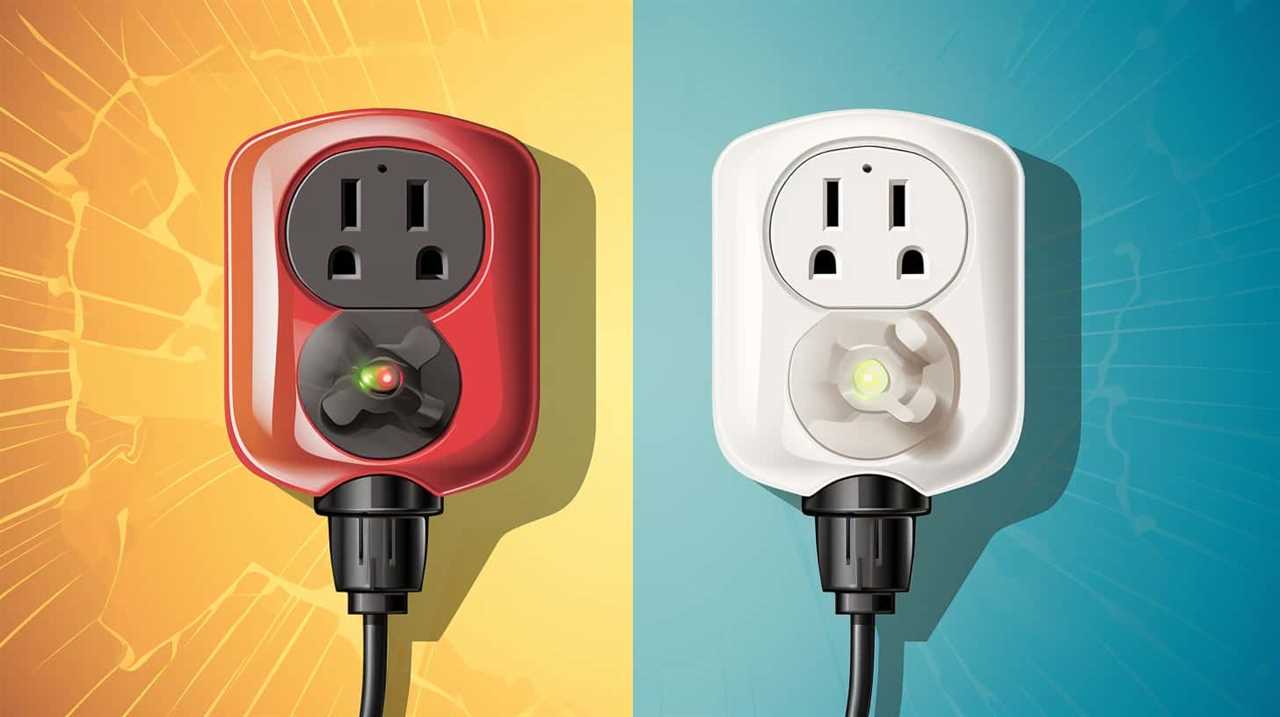
How Much Money Can I Save by Using Efficient Appliances?
By using efficient appliances, we can save a significant amount of money in the long run. Although they may have a higher upfront cost, the energy consumption comparison shows that the cost benefits outweigh the initial investment.
Can I Use Efficient Appliances in Older Homes?
Yes, we can use efficient appliances in older homes. By using energy-saving tips for older houses, such as upgrading insulation, sealing leaks, and properly maintaining appliances, we can reduce energy consumption and save money.
Are There Any Government Incentives for Purchasing Efficient Appliances?
Yes, there are government incentives for purchasing efficient appliances. Energy-saving rebates and tax credits are available to encourage the adoption of these appliances, making them more affordable and environmentally friendly.
How Do Efficient Appliances Contribute to Reducing Greenhouse Gas Emissions?
Efficient appliances contribute to reducing greenhouse gas emissions by impacting energy consumption and utility bills. They use less energy, resulting in lower emissions from power plants. This has environmental benefits, including reducing air pollution and mitigating climate change.
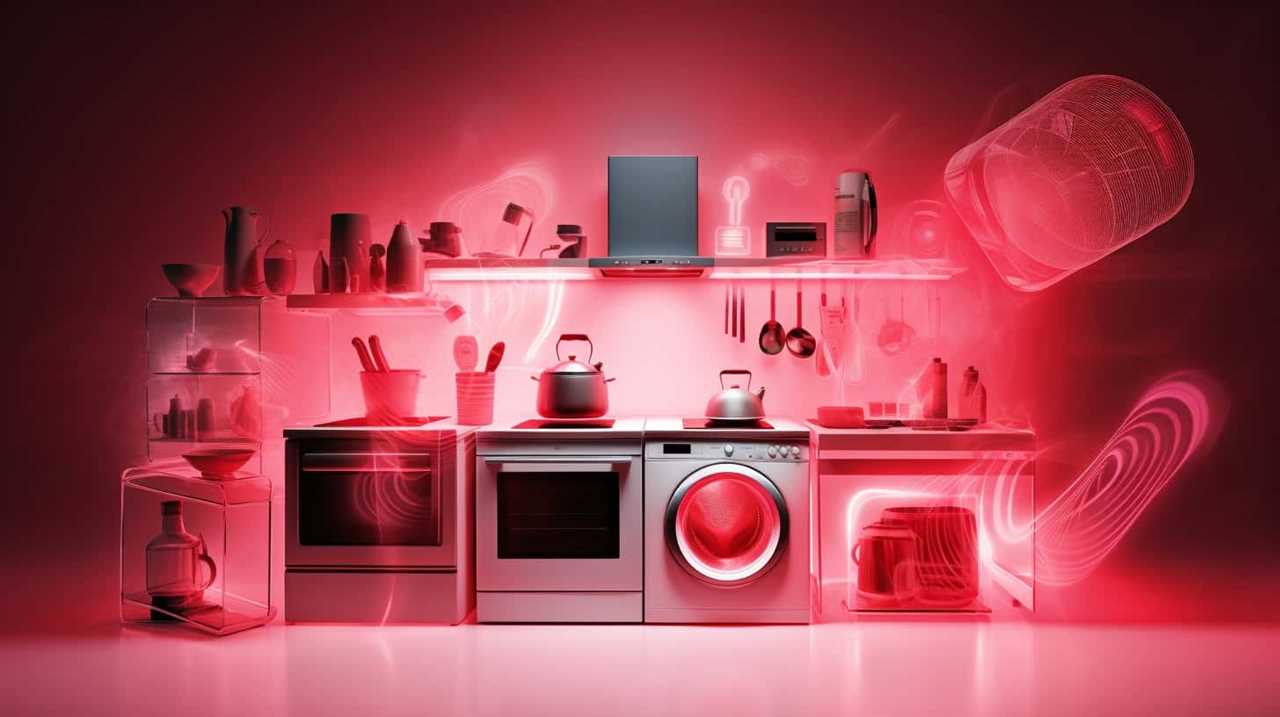
Conclusion
In conclusion, efficient appliances are a smart choice for any home. They not only save energy and resources, but also reduce our impact on the environment. By incorporating these appliances into our daily lives, we can make a significant difference in our carbon footprint.
Remember, every little action counts towards a greener future. So let’s embrace the power of efficiency and create a world that’s both sustainable and comfortable for generations to come.









